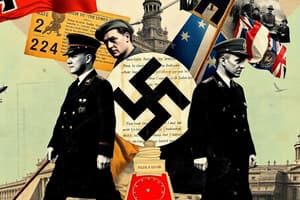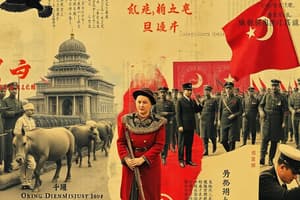Podcast
Questions and Answers
Which revolution led to the establishment of socialism in Russia in the early 20th century?
Which revolution led to the establishment of socialism in Russia in the early 20th century?
- French Revolution
- American Revolution
- Russian Revolution (correct)
- Industrial Revolution
Which two opposing alliances were formed in Europe, leading to the First World War?
Which two opposing alliances were formed in Europe, leading to the First World War?
- NATO and Warsaw Pact
- League of Nations and United Nations
- Triple Alliance and Triple Entente (correct)
- Allied Powers and Central Powers
What major economic event occurred in 1929?
What major economic event occurred in 1929?
- Industrial Revolution
- Russian Revolution
- World War I
- Great Depression (correct)
Which organization was established after the First World War to maintain world peace?
Which organization was established after the First World War to maintain world peace?
Who was the first tsar of Russia?
Who was the first tsar of Russia?
What title did the rulers of the Romanov dynasty use?
What title did the rulers of the Romanov dynasty use?
What ideology saw a rise in Italy as a result of the economic difficulties after World War I?
What ideology saw a rise in Italy as a result of the economic difficulties after World War I?
Which conflict led to a new situation of conflict in Europe before World War II?
Which conflict led to a new situation of conflict in Europe before World War II?
During whose reign was the title 'tsar' first adopted in Russia?
During whose reign was the title 'tsar' first adopted in Russia?
What system of government did the Russian people overthrow to establish socialism?
What system of government did the Russian people overthrow to establish socialism?
Flashcards are hidden until you start studying
Study Notes
Europe in the 20th Century
- The early 20th century witnessed rapid changes in European society and politics, leading to the Russian Revolution against the Western capitalist system, which established socialism in Russia.
- The Russian Revolution had a global impact on state politics, and two opposing ideologies emerged in Europe, eventually leading to World War I.
The Formation of the United Nations
- After World War I, the League of Nations was established to prevent future wars and protect the world from similar devastating conflicts.
Europe in the Inter-War Period
- The post-World War I period saw the rise of fascist and nationalist ideologies in Italy, Germany, and Spain, leading to economic crises, such as the Great Depression of 1929, and the Spanish Civil War.
Russia: From Tsarism to Socialism
- The Russian Empire, which spanned Europe and Asia, was established in the early 19th century, with a despotic and backward system of governance known as "Tsarism."
- The Russian Empire was home to diverse ethnic groups, including Slavs, Tatars, Mongols, and others, as well as different religious denominations, such as Catholic, Protestant, and Islamic.
The Tsarist System
- The Russian monarch, Ivan IV, adopted the title of "Tsar" in 1547, which was later used by the Romanov dynasty that ruled Russia from 1613 onwards.
- The Romanov dynasty was known for its autocratic rule, and its monarchs were referred to as "Tsar," while the queen was referred to as "Tsarina."
Studying That Suits You
Use AI to generate personalized quizzes and flashcards to suit your learning preferences.




